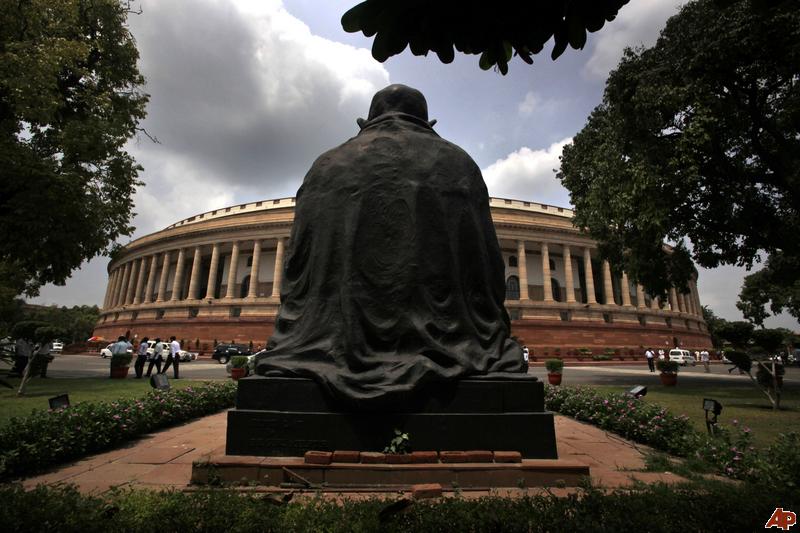Rhetoric But no Action Against Criminals in Politics
Mahatma Gandhi's statue overlooks the parliament, several members of which have a tainted record

NEW DELHI: Every one in three MP’s in the Lok Sabha is an alleged criminal, facing criminal charges from the minor to murder, attempt to murder, causing communal disharmony, kidnapping, crimes against women.
In August several well known individuals wrote to Prime Minister Narendra Modi expressing concern about the criminalisation of politics and urging him to “cleanse the legislatures from criminals.” Two months later , end October, PM Modi responded to the rather passionate plea maintaining that his government was “committed to implement comprehensive electoral reforms.”
The letter was signed by senior advocate Ram Jethmalani, former Lok Sabha Speaker Somnath Chatterjee, retired senior bureaucrats Bhure Lal, KJ Rao, former CBI director Joginder Singh, former DGP Prakash Singh and others. The letter sent to the Prime Minister on August 20 reposed “great faith” in his leadership stating: “the first step in this direction is to close the gateway of the legislature for criminals. An exigency has arisen in view of the impending elections for the four state legislatures.” These elections incidentally have all been held with candidates with criminal cases being fielded for the Assemblies by the political parties in the fray.
The Prime Minister replied to this letter on October 25 saying that the government was abreast of the issue saying, “let me assure you that electoral reforms remain very high on our agenda for clean and transparent governance.” The Assembly elections held in between the exchange of letters in Haryana, Maharashtra, saw no let up in the situation with political parties freely distributing tickets to candidates with criminal charges against them.
Successive governments have paid lip service to the issue although the Supreme Court and the Election Commission have been insistent about action on the ground. As the letter by the individuals pointed out “we feel the recommendations of the Election Commission and the Law Commission are the most reliable implementable and comprehensive documents for decriminalisation of politics.”
An analysis of 541 of the 543 winning candidates by National Election Watch (NEW) and Association for Democratic Reforms (ADR) showed that 186 (34%) of the newly-elected members have disclosed criminal cases against themselves in their affidavits. It has gone up by four per cent since 2009.
In a political system, where money and criminal power started to determine the outcome of elections, it is estimated that a candidate with criminal cases has a 13% chance of winning the Lok Sabha polls as against the four per cent estimate for a candidate with a clean record.
In this Lok Sabha the BJP tops the list with 98 of its 281 MP’s (35%) with criminal cases against them. The Shiv Sena is next with a whopping 83 %, Trinamool Congress with 21% , Congress party with 18% and AIADMK with 16%.
Conviction and jail is not seen as a major impediment with several candidates across the country contesting and winning elections from inside the prisons. In Varanasi that elected Prime Minister Narendra Modi in these elections, the factor of Mukhtar Ansari for instance continued to weigh in the polls. Ansari was determining alliances and results from inside the prison, with his brother speaking for him through the campaign. More recently former Haryana chief minister Om Prakash Chautala came out of jail to spend a few days campaigning for his candidates, until he was finally checked and sent back in again.



